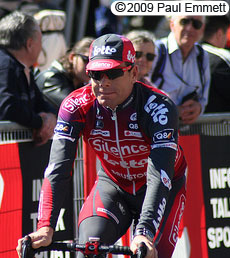 One of the last things Cadel Evans did after a crazy, emotional, exciting day was hang the rainbow jersey in a prominent place in his house. He’d waited so long to reach the top step of a world championship podium that it was hard to accept that he’d finally succeeded.
One of the last things Cadel Evans did after a crazy, emotional, exciting day was hang the rainbow jersey in a prominent place in his house. He’d waited so long to reach the top step of a world championship podium that it was hard to accept that he’d finally succeeded.
“It is hanging up on the wall because my wife and I didn’t really believe I’d won it,” he told veteran Australian journalist John Trevorrow. “So if I hung it up on the wall and it is still there when I wake up in the morning, it means it’s true.”
Evans is still coming to terms with the result, the biggest one day victory of his career and also the first Elite world championship ever secured by an Australian. It finally drew a line through the criticism he’d faced that he choked at crucial moments, and that he was an eternal runner-up; as he said in the post-race press conference, everything came together at the perfect moment, and in the perfect location.
“The finish line today is three kilometres from my home away from home here, the place where I spend nine months of the year,” he stated. “I have seven world championship medals, none of which were gold, and now I’ve taken this, so close to where I live. It is quite exceptional, especially after the bad luck I’ve had this year.”
Following his third place in the Vuelta a España, Evans went into the race as one of the tipped riders. Most mentioned him as a contender, but few believed he’d do better than get one of the two lesser medals. His own past history ensured that, as well as his lack of a sprint. Yet in the end, that outsider status played in his favour, as Garmin-Slipstream boss Jonathan Vaughters noted.
“It was an impressive win by Cadel,” he said on his Twitter feed immediately after the race. “He was underestimated today, which is exactly what he needed to win. A bit less pressure, and a bit of space.”
Evans has been a pro for many seasons and he used his experience to good effect, reading the race finale perfectly. But earlier on, he was concerned that he’d missed the winning move.
A large group of riders had gone clear in pursuit of an early break, this move including past champions Alessandro Ballan (Italy) and Tom Boonen (Belgium), as well as his Australian team-mate Michael Rogers.
“Michael was in there and I thought it was going to be up to him to do the result for the country today,” said Evans. “When that big group went 95 km to go I thought maybe the race was over. Four Italians were in front, 40 guys away and a long way up there. I thought for a moment, this is one year a really early break goes and succeeds.”
Taking the decision that Rogers wouldn’t win, the Australian team chased hard and eventually the move was brought back. That ensured that all the big guns were back in the equation, and Evans used strength and intelligence to win out.
“Today I was sure Cancellara was going to make it to the finish. I saw him in Beijing and when he is really motivated, he surprises people. I saw where his strengths and weaknesses were on the circuit today and of course I kept that in mind when I was riding my own race. Fortunately that worked to my benefit.
“Obviously Spain had the numbers up there, with three riders. I think just Cunego was there, so Italy only had one, and we had only one. So if a Spanish rider got away there wouldn’t be anyone there to chase him down. That is why when Spain made a move, I made sure I was there.”
Evans responded to an attack by Joaquin Rodriguez, bridging across with Alexandr Kolobnev (Russia), and then attacked hard on the final climb. He crossed the summit 13 seconds clear and extended his lead all the way to the finish line, where he saluted the crowd, kissed the wedding ring worn on a chain around his neck, and crossed the line to the biggest success of his career.
“The world’s been telling me for years I can’t win big races, can’t win one day races, because my job is to win stage races,” he said. “Then today I come out and win the World Championship. I don’t quite believe it.”
It was a huge moment for Australian cycling, and followed on from Jack Bobridge’s fine win in the Under 23 time trial on Wednesday. The world championships has been televised live in Australia for the first time this year, and so the audience back home has been able to see the country take two gold medals and confirm its status as the third-ranked country in the world.
As Evans stated afterwards, the current batch of pro riders has been an important part in the burgeoning popularity of the sport there. “Cycling is not part of our culture, but in the last three or four years there has been a huge growing interest in the Tour de France and cycling because of the successes of our riders,” he said.
If that success is the main reason for the growth, Australian cycling is now facing a even bigger jump in popularity. The rainbow jersey now hanging on the wall of his home has guaranteed that much.